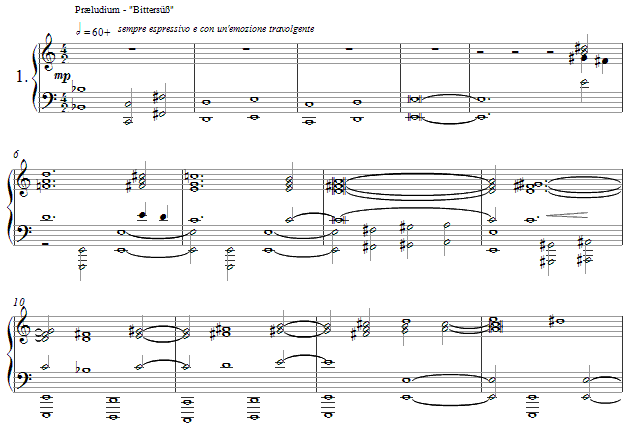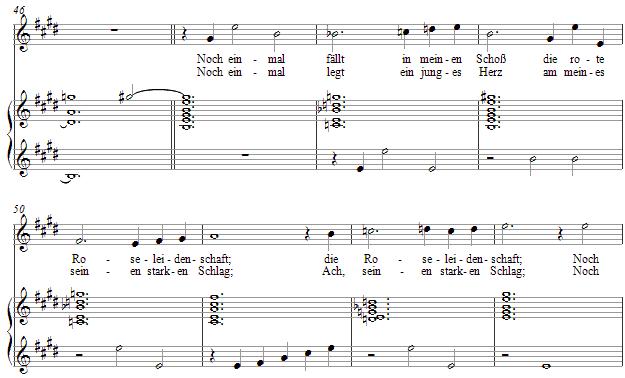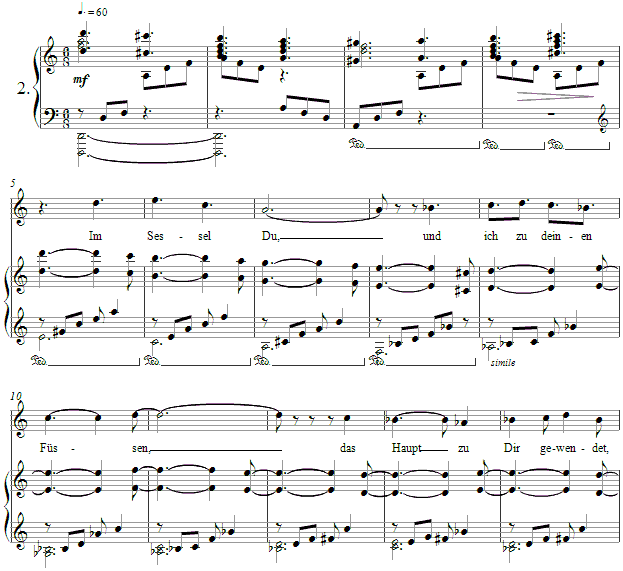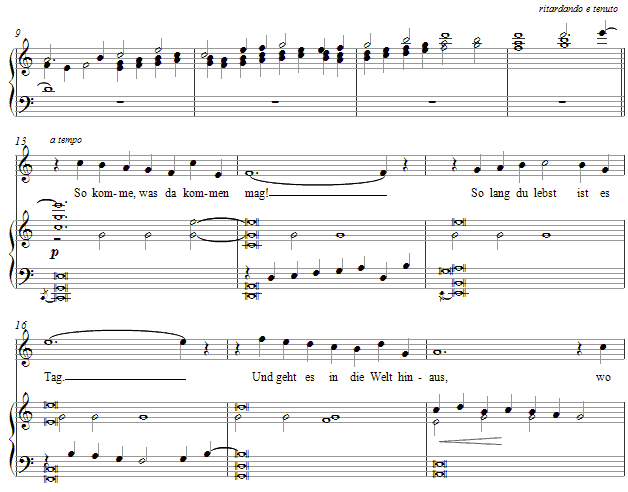Music and Texts of GARY BACHLUND Vocal Music | Piano | Organ | Chamber Music | Orchestral | Articles and Commentary | Poems and Stories | Miscellany | FAQs |
Drei einfache Lieder von Theodor Storm - (1996)
for soprano or mezzo soprano and piano / soprano or mezzo soprano and strings and harp
Melanie Mollen gewidmet
i. Noch einmal (Noch einmal!) [ 4 pages, circa 5' 25" ]
Noch einmal fällt in meinen Schoß
Die rote Rose Leidenschaft;
Noch einmal hab ich schwärmerisch
In Mädchenaugen mich vergafft;
Noch einmal legt ein junges Herz
An meines seinen starken Schlag;
Noch einmal weht an meine Stirn
Ein juniheißer Sommertag.
ii. Zwischen mir und Dir (zweite Strophe, "Dämmerstunde") [ 3 pages, circa 2' 00" ]
Im Sessel du, und ich zu deinen Füßen -
Das Haupt zu dir gewendet, saßen wir;
Und sanfter fühlten wir die Stunden fließen,
Und stiller ward es zwischen mir und dir;
Bis unsre Augen ineinander sanken
Und wir berauscht der Seele Atem tranken.
iii. Tag (Trost) [ 2 pages, circa 4' 10" ]
So komme, was da kommen mag!
So lang du lebst, ist es Tag.
Und geht es in die Welt hinaus,
Wo du mir bist, bin ich zu Haus.
Ich seh' dein liebes Angesicht,
Ich seh' die Schatten der Zukunft nicht.
Total duration [ 10 pages, circa 11' 35" ]
Theodor Storm
"I do not see the shadows of the future."
Contemplating the bitter nature and future shadows of fleeting life, it is bittersweet love which is the counterbalance to sorrow, love which is the conqueror at least for a time, and it is love's sometime "red rose of passion" and love's quiet as well which allows us to ignore those "shadows of the future."
While these poems of a man -- Theodor Storm -- speak of falling into a "maiden's eyes," the songs themselves are intended for a woman's voice, for, as with that "maiden's eyes" and "lovely face" into which one's heart may fall, the songs, meant for a man, are to be sung to a man as well, a voice the extension of the charms of that one "youthful heart." Whose youthful heart? Even the love stories of and in the mature years and old age contain within them such hearts, if we allow it. It is the defense against seeing only the bitter by acknowledging the bittersweet nature of life and love, in which the sweet continues alongside the bitter, tempering it and even conquering it.
i. Once Again
Once again fell into my lap
The red rose of passion;
Once again had I rapturously
fallen into a maiden's eyes;
Once again a youthful heart laid
its strong beating on my heart;
Once again wafted on my brow
a June-warm summer's day.
ii. Between you and me
In the chair, you, and I at your feet -
My head turned to you, we sat;
And gently we felt the hours flow,
And quieter was it between me and you;
Until our eyes sunk into each other's
and we enchantingly drank from the soul's breath.
iii. Day
So come, whatever must come!
As long as you live, it is day.
And whatever happens in this world,
Where you are, I am at home.
I see you lovely face,
I do not see the shadows of the future.
The tessitura of this short, simple cycle is limited such that a soprano or mezzo soprano might sing it. The opening includes an extended introduction, marked as "Præludium." It touches on the bittersweet nature of life and love, before the first text is sung.
With the opening lines of text, a brighter mood is formed, in some way diminishing the bitter of the bittersweet. Yet the alternation of E major and G minor insist on the admittance of both the light and dark. The setting is strophic as is the text. As the songs are so simple, they are equally difficult because of the transparency and challenge to simply sing without histrionics and without excess.
The second text pictures a simple setting, "you" at my feet as I do nothing more than sit in a chair, one head turned towards the other. This poignant scene may mean little or much, depending upon what the heart brings to bear upon this little scene in a larger drama. In the context of D minor, the shifting whole tone harmonies suspend the moment, and introduce tones relatively distant from the tonic minor.
The last text is notated in a "long" 4/2 meter, and has itself a short præludium of simple quarter and half notes leading into the opening accompaniment figure of open C major chords. The harmonic progression is simple and the tenor line of the accompaniment sings a response to each phrase if the soprano. The last statements of this theme rise to D major, and thence to a short reprise of the theme from "Noch einmal," as a dramaturgical gambit to suggest that these scenes -- as surely Storm's texts suggest -- are a bittersweet reflection of a specific time and place held fondly in memory.
The texts were suggested by Melanie Mollen in Kaiserslautern in 1995, along with a recommendation for some marvelous poems in the local dialect Pälzer Deutsch -- which I have not set as yet.
The score is available as a free PDF download, though any major commercial performance or recording of the work is prohibited without prior arrangement with the composer. Click on the graphic below for this piano-vocal score. The score for strings and harp is available by contacting me directly.
Drei einfache Lieder von Theodor Storm




